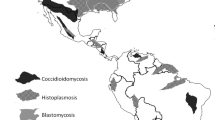Abstract
Serologic testing is important for diagnosis of coccidioidomycosis. Many methods are available for diagnostic testing. Enzyme immunoassay (EIA) can be performed quickly and locally but has the potential for false-positive results in patients manifesting a positive EIA for immunoglobulin M (IgM) antibodies and a negative EIA for immunoglobulin G (IgG). We retrospectively reviewed the charts of 405 patients with coccidioidal serologic testing performed between 1999 and 2003. Of 706 EIAs, 37 (5%) produced test results for 28 patients that showed isolated IgM positivity. Among these 28 patients, 24 (86%) had positive serologic findings by other methods (complement fixation or immunodiffusion or both), and 7 (25%) had positive microbiologic or histopathologic findings. All 4 (14%) patients without other positive serologic results had diagnostic tests with positive microbiologic or histopathologic results. No false-positive IgM assays were observed. We conclude that the false-positive rate of the EIA IgM is low, and that an isolated positive EIA IgM should prompt further follow-up and diagnostic testing.

Similar content being viewed by others
Abbreviations
- ADHS:
-
Arizona Department of Health Services
- CF:
-
Complement fixation
- EIA:
-
Enzyme immunoassay
- HIV:
-
Human immunodeficiency virus
- ID:
-
Immunodiffusion
- IgG:
-
Immunoglobulin G
- IgM:
-
Immunoglobulin M
References
Crum NF, Lederman ER, Stafford CM, Parrish JS, Wallace MR. Coccidioidomycosis: a descriptive survey of a reemerging disease: clinical characteristics and current controversies. Medicine (Baltimore). 2004;83:149–75.
Chiller TM, Galgiani JN, Stevens DA. Coccidioidomycosis. Infect Dis Clin North Am. 2003;17:41–57.
Anstead GM, Graybill JR. Coccidioidomycosis. Infect Dis Clin North Am. 2006;20:621–43.
Pappagianis D, Zimmer BL. Serology of coccidioidomycosis. Clin Microbiol Rev. 1990;3:247–68.
Blair JE, Coakley B, Santelli AC, Hentz JG, Wengenack NL. Serologic testing for symptomatic coccidioidomycosis in immunocompetent and immunosuppressed hosts. Mycopathologia. 2006;162:317–24.
Wieden MA, Lundergan LL, Blum J, Delgado KL, Coolbaugh R, Howard R, et al. Detection of coccidioidal antibodies by 33-kDa spherule antigen, Coccidioides EIA, and standard serologic tests in sera from patients evaluated for coccidioidomycosis. J Infect Dis. 1996;173:1273–7.
Kaufman L, Sekhon AS, Moledina N, Jalbert M, Pappagianis D. Comparative evaluation of commercial Premier EIA and microimmunodiffusion and complement fixation tests for Coccidioides immitis antibodies. J Clin Microbiol. 1995;33:618–9.
International classification of diseases, 9th revision, clinical modification: Med-Index ICD-9-CM. 4th ed. Salt Lake City (UT): Med-Index; 1994.
Palmer DF, Kaufman L, Kaplan W, Cavallaro JJ, editors. Serodiagnosis of mycotic diseases. Springfield (IL): Charles C Thomas; 1977.
Kuberski T, Myers R, Wheat LJ, Durkin M, Connolly P, Kubak BM, et al. Diagnosis of coccidioidomycosis by antigen detection using cross-reaction with a Histoplasma antigen. Clin Infect Dis. 2007;44:e50–4.
Saubolle MA, McKellar PP, Sussland D. Epidemiologic, clinical, and diagnostic aspects of coccidioidomycosis. J Clin Microbiol. 2007;45:26–30.
Martins TB, Jaskowski TD, Mouritsen CL, Hill HR. Comparison of commercially available enzyme immunoassay with traditional serological tests for detection of antibodies to Coccidioides immitis. J Clin Microbiol. 1995;33:940–3.
Pappagianis D. Serologic studies in coccidioidomycosis. Semin Respir Infect 2001;16:242–50.
Smith CE, Saito MT, Beard RR, Kepp RM, Clark RW, Eddie BU. Serological tests in the diagnosis and prognosis of coccidioidomycosis. Am J Hyg. 1950;52:1–21.
Author information
Authors and Affiliations
Additional information
J. T. Currier was a Visiting Research Trainee at the Division of Infectious Diseases, Mayo Clinic, Scottsdale, AZ.
Rights and permissions
About this article
Cite this article
Blair, J.E., Currier, J.T. Significance of Isolated Positive IgM Serologic Results by Enzyme Immunoassay for Coccidioidomycosis. Mycopathologia 166, 77–82 (2008). https://doi.org/10.1007/s11046-008-9129-9
Received:
Accepted:
Published:
Issue Date:
DOI: https://doi.org/10.1007/s11046-008-9129-9



